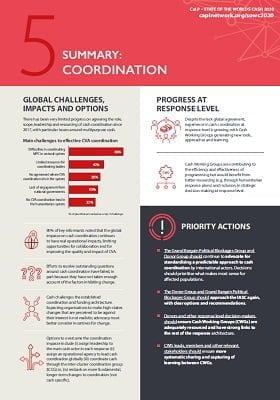Coordination
Contexte
Une coordination efficace peut éviter les risques de lacunes et de duplication dans les interventions humanitaires et optimiser l’impact des transferts monétaires pour les populations affectées par une crise, mais aussi aider à tirer le maximum de financements humanitaires limités. Cependant, le rapport « La situation mondiale des transferts monétaires » du réseau CaLP montre que la coordination des transferts monétaires est vue comme inefficace et variable, ce qui affecterait fortement les opérations.
95 bailleurs, ONG internationales et nationales, acteurs du secteur privé et une agence de l’ONU ont demandé plus d’informations sur deux problématiques clés concernant la coordination des transferts monétaires :
- qui doit être responsable de la coordination des transferts monétaires ;
- quelle doit être la portée de la responsabilité des groupes de travail sur les transferts monétaires, notamment concernant les transferts monétaires à usages multiples.
Priorités actuelles
Nous cherchons à contribuer à la résolution de cette problématique à trois niveaux : en aidant les groupes de travail sur les transferts monétaires au niveau régional ; en contribuant à trouver des solutions pratiques pour la coordination des transferts monétaires au niveau mondial ; et en organisant des discussions basées sur des données probantes sur les problématiques clés, en soulignant les points de discussion essentiels et les opportunités de progrès.
Contenu associé

Cash Coordination – LIVE timeline
Page
The latest updates on cash coordination as they unfold.

95 Organisations Sign Letter Calling for Strengthened Cash Coordination
News
Today a letter signed by 95 organisations was handed into the Emergency Relief Coordinator (ERC) urging the Inter-Agency Standing Committee (IASC) to take a decision on the leadership and scope of cash coordination in the coming year.

Is cash transforming the humanitarian system or is the system limiting how cash is used?
Blog Post
At the State of World’s Cash 2020 launch event, Sorcha O’Callaghan, Director of Humanitarian Policy Group at ODI warned that, “Cash offers a huge transformative potential, but as far as the system is privileging the interest of the agencies over people in crisis, we won’t be able to see it”. If you missed the State of the World's Cash 2020 launch we're sharing highlights. Quote 4...

State of the World’s Cash 2020 Chapter 5 summary: Coordination
Report
There has been very limited progress on cash coordination since 2017. Cash continues to challenge the established coordination and funding architecture, and efforts to resolve outstanding questions around cash coordination have failed. Despite the lack of global agreement, Cash Working Groups are pushing forward and contributing to improved programming, and generating new approaches. This...

Fiche conseils sur la coordination des transferts monétaires
Guides et outils
Les Transferts Monétaires (TM) représentent une part croissante de la réponse humanitaire globale, avec un montant estimé à 4,7 milliards de dollars distribués dans le monde en 2018, contre 2,8 milliards de dollars en 2016. Dans ce contexte, une coordination efficace des TM est un élément de plus en plus essentiel pour garantir une réponse humanitaire de qualité. Le rapport « State...

Introducing the Cash Coordination Tip Sheet
Webinar
The CALP Network has developed a tipsheet setting out established best practice and key guidance and resources for all aspects of cash coordination, intended as a clear, accessible and action-oriented guide for those engaged in coordination of cash and voucher assistance at the field level.

Cash Coordination: A proposal from members in MENA
Blog Post
Earlier this year the CALP Network undertook regional consultations to explore options for cash coordination. This blog lays out recommendations from participants from the Middle East and North Africa who sketched out what cash coordination, and coordination more broadly, could look like in future to support a more effective, efficient and accountable response.
Thematic lead
Contenu récent
Aucun résultat trouvé
Contenu indisponible actuellement.



